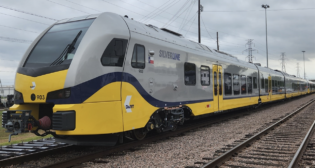
SEPTA Board Approves FY24 Operating, Capital Budgets
Written by Marybeth Luczak, Executive Editor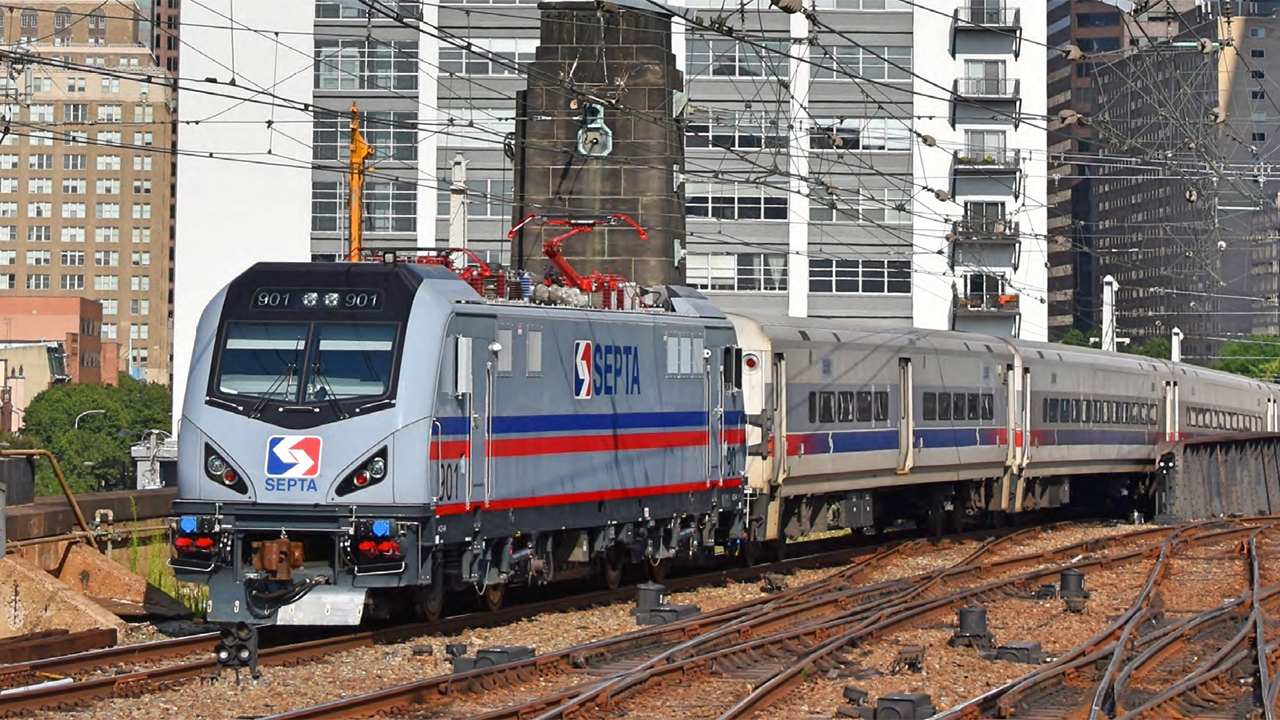
Southeastern Pennsylvania Transportation Authority (SEPTA) on June 22 reported that the Board had signed off on its operating and capital budgets for FY 2024—the last budget year before the transit authority said it will hit a “fiscal cliff,” resulting in service cuts and fare increases without additional state funding for everyday operating expenses.
The proposals were released in April; now approved, they take effect July 1, 2023.
According to SEPTA, the $1.69 billion FY24 operating budget (download below) uses the final installment of federal COVID relief funding “that has helped to avoid service cuts and fare increases associated with pandemic-induced revenue losses.” By April 2024, the federal COVID relief funding is forecast to be exhausted and SEPTA will face recurring structural deficits exceeding $240 million starting in FY 2025, the transit authority said.
“To ensure SEPTA can provide services that are essential to our city and region, and to continue to drive the commonwealth’s economy, we need help from our funding partners in Harrisburg,” SEPTA Board Chairman Pasquale T. Deon Sr. said. “The looming fiscal cliff threatens SEPTA’s ability to provide reliable day-to-day services—let alone run extra trains when there is an emergency like the I-95 collapse or ramp up for the 2026 FIFA World Cup.”
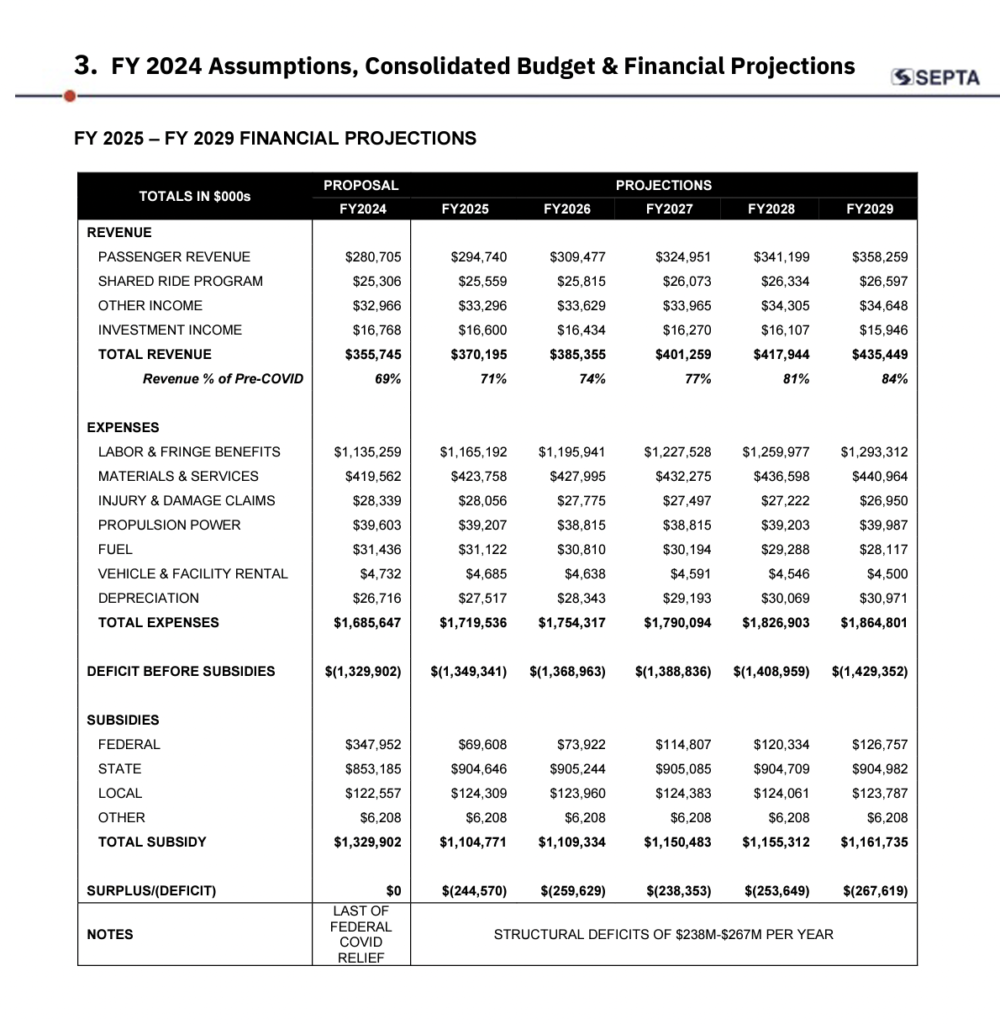
SEPTA reported that it has taken action to prepare for “a new post-pandemic normal”:
- Plans are advancing to make bus service “more efficient and effective” with the Bus Revolution initiative.
- The authority has prioritized replacing the Market-Frankford Line fleet to ensure this “critical artery” is reliable for customers in both the short-and long-term.
- Reimagining Regional Rail “will make the system more useful for more people.”
Additionally, SEPTA reported that it “remains committed to being a good steward of the taxpayer funds and customer fares it receives.” It has:
- Completed the first year of implementing an employee-driven Efficiency and Accountability program, which it said will result in recurring annual benefits of more than $38 million with a three-year target of more than $100 million.
- Fully launched the SEPTA Key Advantage initiative, which the transit authority described as an institutional pass program “that is encouraging more transit ridership” and already has more than 30,000 eligible participants. SEPTA noted that there are also targeted fare enhancements in the FY 2024 operating budget to help encourage more ridership.
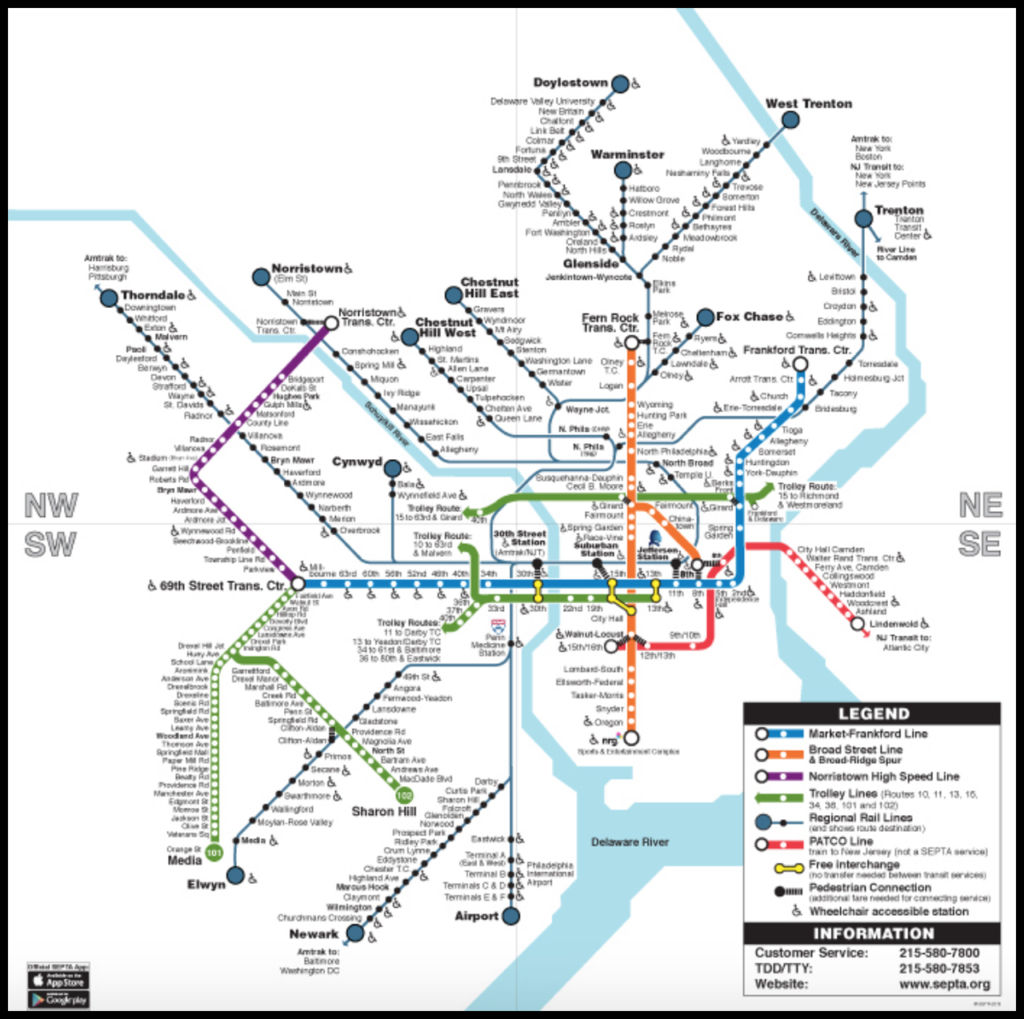
SEPTA reported that its capital budget of $976 million is just shy of last year’s billion-dollar plus plan, while the 12-Year Program represents its “largest-ever investment in the system” at $12.6 billion (download below).
“These historic funding levels are made possible by increased federal funding resulting from the November 2021 enactment of the Infrastructure Investment and Jobs Act (IIJA), also referred to as the Bipartisan Infrastructure Law (BIL), and the transition of Pennsylvania Act 89 Public Transportation funding sources from reliance on Pennsylvania Turnpike Commission bonds to the state’s Motor Vehicle Sales and Use Tax,” according to SEPTA. “The infusion of federal capital assistance, along with the transition of state funding to a sustainable and bondable funding source allows SEPTA to address its $5.1 billion state of good repair backlog while planning for future service improvements to ensure capital dollars are invested to advance equity, safety, ADA accessibility, and service reliability. With the transition of state funding to a sustainable and bondable source, SEPTA is able to leverage against forecasted state revenues to issue bonds to support critical capital investments. These projected bond revenues significantly increase the authority’s capital program, allowing it to address the critical state of good repair backlog earlier, including supporting the acquisition of new vehicles to replace the nation’s oldest railcar fleet. Also supporting SEPTA’s capital program is a transformative commitment of $299.72 million in federal Congestion Mitigation and Air Quality program (CMAQ) flex funds beginning in FY 2025, supported by our local partners the city of Philadelphia and Bucks, Chester, Delaware, and Montgomery counties and the Delaware Valley Regional Planning Commission. These additional flexed federal highway dollars enable SEPTA to commit significant dollars to advancing its ‘Projects of Significance.’ SEPTA continues to work with local funding partners to identify additional regional funding to help leverage and maximize federal and state resources to address SEPTA’s capital needs.”
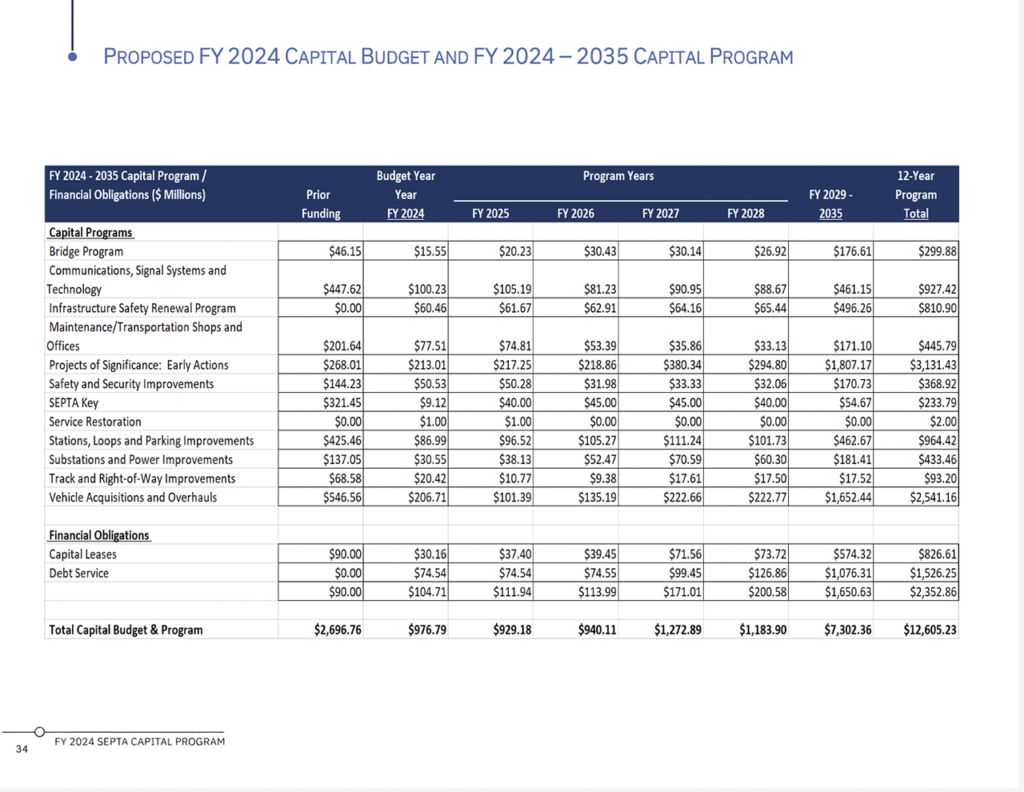
According to SEPTA, the capital program advances several initiatives of its strategic plan (SEPTA Forward), including:
- Trolley Modernization: $1.63 billion for vehicle acquisition and infrastructure upgrades. (SEPTA on Feb. 23 awarded a contract to Alstom Transportation, Inc., for 130 new Citadis™ light rail vehicles, with an option to order up to 30 more. The base order is valued at approximately $714 million.)
- Market-Frankford Line Railcar Replacement: $950 million for vehicle acquisition, infrastructure upgrades and a new signal system.
- Regional Rail Fleet Replacements: $650 million to initiate the replacement of 50-year-old railcars.
- Wayfinding Improvements: $40 million for signage, real-time information and website/mobile app upgrades.
- State of Good Repair and Safety: $3.6 billion to rehabilitate and modernize aging legacy assets.
- Accessibility for All: Nearly $1 billion to provide full ADA accessibility at 45 rail transit and regional rail stations over the next 12 years. By the end of this 12-year program, SEPTA reported, 100% of subway/elevated and trolley stations will be ADA accessible.
- Bus Revolution: $163 million for end-of-line facilities and transit prioritization improvements.
“Despite higher-than-ever funding levels, we are still not keeping up with our peers or even our own backlog of needs,” said Leslie S. Richards, who last month was reappointed as SEPTA’s General Manager and CEO. “SEPTA still requires additional state and local resources to maximize billions of dollars in federal competitive funds that are available under the IIJA. We are determined not to leave any money on the table.”
SEPTA in March sidelined the King of Prussia Rail Project, which it said “fell victim to rising construction costs and a lack of state and local resources to match available federal funding.”



